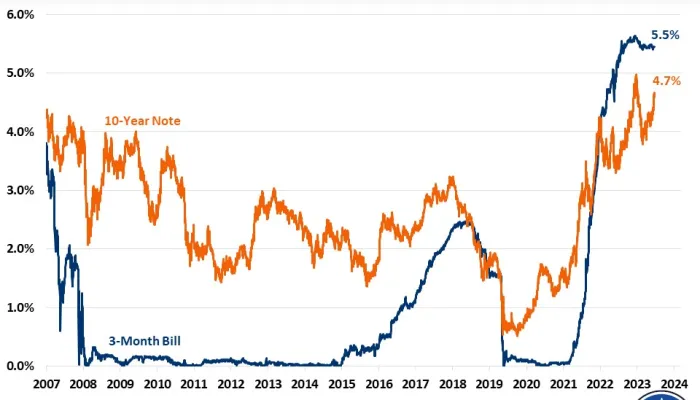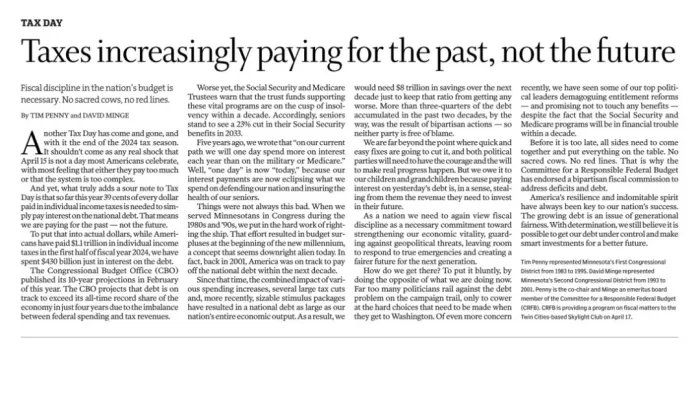The Debt Won't Magically Solve Itself
Over the past few weeks, we've seen a common argument in favor of turning away from solving our long-term debt problem due to short-term improvements in the last CBO Economic and Budget Outlook. While the short-term improvements are a welcomed sign, we've also shown that work still remains and our current long-term outlook carries many serious risks that demands a plan to deal with our debt.
In a The New York Times piece titled "This Can't Go On Forever," the author portrays the consequences of a rising debt path well (emphasis added):
Realistic budget projections say that current policies aren't remotely sustainable. For example, a month ago a joint report of the Committee for Economic Development (a business group), the bipartisan Concord Coalition and the Center on Budget and Policy Priorities concluded that under current policies, federal debt would rise by $5 trillion over the next decade. And then baby boomers will start collecting benefits, and our debt will really explode.
Such explosive growth in debt can't go on forever, and it won't. Yet our current leaders and their apologists insist that the problem will magically solve itself. Last year's deficit came in slightly below forecasts, and we've had one quarter of good economic growth -- see, we'll grow out of the deficit!
But we won't, and there will eventually be a day of reckoning.
Another piece by the same author called "A Fiscal Train Wreck" argued that the real problem is the long-term:
What's really scary -- what makes a fixed-rate mortgage seem like such a good idea -- is the looming threat to the federal government's solvency.
That may sound alarmist: right now the deficit, while huge in absolute terms, is only 2 -- make that 3, O.K., maybe 4 -- percent of G.D.P. But that misses the point [that the real fiscal threat is the future Social Security and Medicare liabilities]…
I think that the main thing keeping long-term interest rates low right now is cognitive dissonance. Even though the business community is starting to get scared -- the ultra-establishment Committee for Economic Development now warns that ''a fiscal crisis threatens our future standard of living'' -- investors still can't believe that the leaders of the United States are acting like the rulers of a banana republic. But I've done the math, and reached my own conclusions -- and I've locked in my rate.
The author? Surprisingly, the answer is economist Paul Krugman. He wrote this column in 2003 about the deficits under President Bush, which were the same size as a share of GDP as they are projected to be in 2014 under current law. But this Sunday's column by Krugman in the Times, "Fight the Future," presents a different take.
What’s the problem with focusing on the long run? Part of the answer — although arguably the least important part — is that the distant future is highly uncertain (surprise!) and that long-run fiscal projections should be seen mainly as an especially boring genre of science fiction. In particular, projections of huge future deficits are to a large extent based on the assumption that health care costs will continue to rise substantially faster than national income — yet the growth in health costs has slowed dramatically in the last few years, and the long-run picture is already looking much less dire than it did not long ago.
Now, uncertainty by itself isn’t always a reason for inaction. In the case of climate change, for example, uncertainty about the impact of greenhouse gases on global temperatures actually strengthens the case for action, to head off the risk of catastrophe.
But fiscal policy isn’t like climate policy, even though some people have tried to make the analogy (even as right-wingers who claim to be deeply concerned about long-term debt remain strangely indifferent to long-term environmental concerns). Delaying action on climate means releasing billions of tons of greenhouse gases into the atmosphere while we debate the issue; delaying action on entitlement reform has no comparable cost.
In fact, the whole argument for early action on long-run fiscal issues is surprisingly weak and slippery. As I like to point out, the conventional wisdom on these things seems to be that to avert the danger of future benefit cuts, we must act now to cut future benefits. And no, that isn’t much of a caricature.
So who is right, Paul Krugman in 2003 or Paul Krugman today? In our view, the earlier Krugman is still right. While some of the surrounding economic conditions have changed, the long-term problem associated with population aging and health care cost growth, just as in 2003, has not been adequately addressed. Indeed, the threat of population aging is now far more immediate. We’ve made the case many times before on the need for further deficit reduction over the next decade and beyond. And while it is true that, as Krugman points out, sharp immediate cuts can be counterproductive when the economy is so weak, most responsible plans actually talk about replacing sharp cuts (sequestration) with phased-in and targeted reforms that protect a recovering economy.
But why act now, if most of the deficit reduction will be back-loaded anyway? There are a number of important reasons.
From a fiscal standpoint, even small upfront savings can compound going forward and reduce future interest costs, thus helping to protect against the risk of an interest rate shock. From an economic perspective, enacting long-term reforms today can help provide market confidence and certainty while also serving as an opportunity to enact pro-growth tax and spending reforms. From a generational perspective, acting sooner will allow less cuts and tax increases to be shared more broadly across more Americans than if we wait and are forced to exempt more generations of Americans from the price of deficit reduction. And from a policy perspective, acting soon allows policies to be phased in gradually and with ample warning rather than implemented abruptly and without warning. This not only reduces the risk of excessively harsh austerity, but has the moral and economic benefit of allowing individuals and business to plan and adjust for any changes.
Finally and perhaps most importantly, from a political economy perspective it is likely only possible to enact major long-term adjustments absent a crisis if done so well in advance. It is highly unlikely that in 2018 – when debt starts to grow again relative to GDP – policymakers will be able to snap their fingers and instantly shrink the size of government or grow the pot of revenue. In the real world, most changes occur gradually -- often through freezing, slowing, or accelerating the growth of various provisions rather than dramatically cutting or increasing their nominal value. The implication is that even though our debt problems are likely at bay for the next five years, they are large enough in the future that we need to start making gradual adjustments now which build over time.
This is why in their own budget, the Obama Administration replaces abrupt cuts from sequestration and the SGR with gradual changes like adopting the chained CPI (0.25 percent slower growth per year), slowing the growth of post-acute care payments (1.1 percent slower growth per year), and slowing the growth of discretionary spending (about 0.7 percent slower per year from 2017 to 2023) in order to begin to put the debt on a downward path relative to the economy.
Paul Krugman’s thoughts on the budget (emphasis added)?
We have good priorities and plausible projections. What’s not to like about this budget? Basically, the long run outlook remains worrying.
According to the Obama administration’s budget projections, the ratio of federal debt to G.D.P., a widely used measure of the government’s financial position, will soar over the next few years, then more or less stabilize. But this stability will be achieved at a debt-to-G.D.P. ratio of around 60 percent. That wouldn’t be an extremely high debt level by international standards, but it would be the deepest in debt America has been since the years immediately following World War II. And it would leave us with considerably reduced room for maneuver if another crisis comes along.
Furthermore, the Obama budget only tells us about the next 10 years… America’s really big fiscal problems lurk over that budget horizon: sooner or later we’re going to have to come to grips with the forces driving up long-run spending — above all, the ever-rising cost of health care.
Unfortunately, that was the Paul Krugman of 2009.


